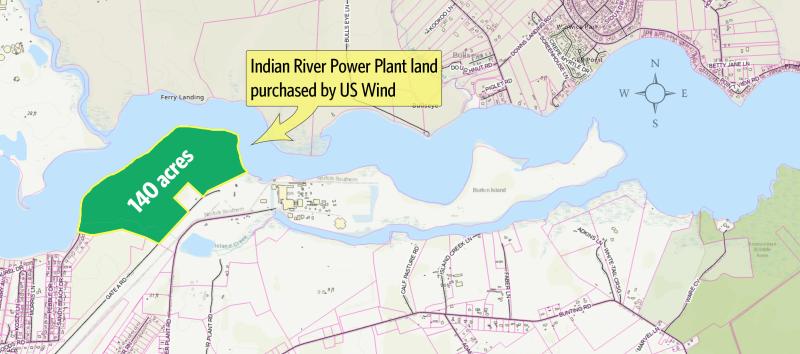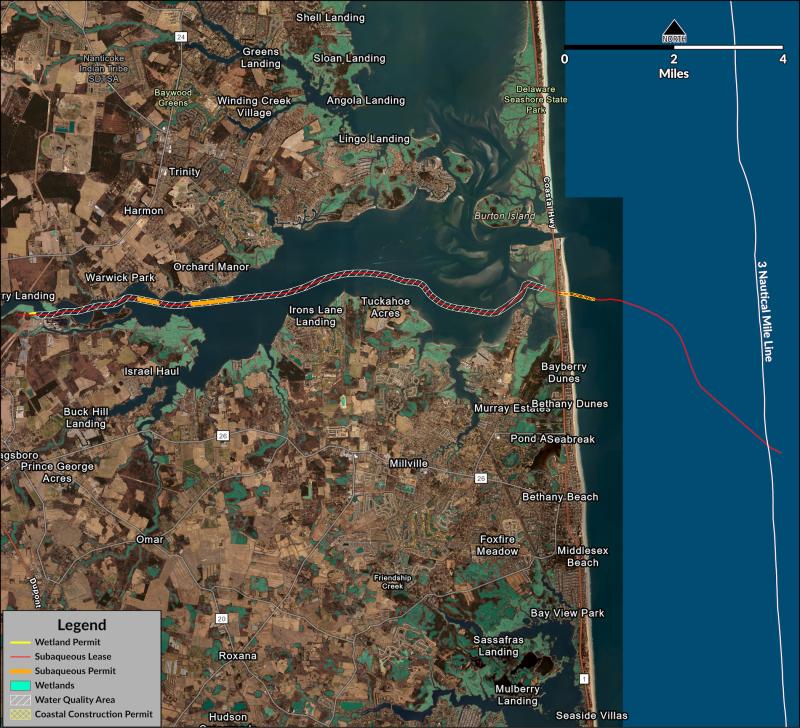Sussex votes against offshore wind substation

Citing a lack of benefits for Sussex County and its residents, county council denied a conditional-use permit for a new substation that would be used by US Wind’s offshore wind farm, during its meeting Dec. 17.
Under the name Renewable Redevelopment LLC, US Wind purchased 140 acres of land adjacent to the Indian River power plant in Dagsboro about one year ago. The company’s project, which recently received federal and state permit approvals, comprises up to 121 wind turbine generators, up to four offshore substations, up to four offshore export cables and one meteorological tower in ocean waters due east of Ocean City, Md. The offshore export cables are proposed to land at 3R’s Beach, north of Bethany Beach, and interconnect with the proposed substation, which would take up 23.5 acres of the total 140.
The Sussex County Planning & Zoning Commission recommended approval of the conditional use in early July. County council conducted a hearing in late July, but deferred action. The 4-1 vote against the conditional-use application came during the final council meeting of the year, and the final meeting for three of the five members. There was no discussion before the vote.
Councilman Douglas Hudson started the voting by saying the county has reviewed applications for substations in the past, but this one was different. The applicant has not proved that it will provide a direct benefit to the citizens of Sussex County, he said.
“Sure, new construction creates temporary work for the community, but I’m focused on the long-term benefits,” said Hudson. “This project does not benefit the inhabitants of Sussex County. Therefore, I vote no.”
Councilman Mark Schaeffer, in his last meeting as a councilman, said he was voting against the application because the project and its benefits flow to Maryland. There are no jobs created and there could be devastating environmental risks to waterways, ocean and land, he said.
Councilwoman Cynthia Green, in her last meeting as councilwoman, kept her reasons simple. She said she agreed with Hudson and Schaeffer, and that there were no benefits to Sussex County.
Councilman John Rieley said even less. He said he agreed with Hudson and Schaeffer.
Council President Michael Vincent, overseeing his final county council meeting, was the lone vote in favor of the application. There have been a few applications for substations over the years, and county council has never asked the applicant where the power is coming from or where it is going, he said.
US Wind comment on denial
The day after county council’s vote, US Wind CEO Jeff Grybowski said it was a terrible anti-business decision by the county and there was no basis for the denial.
“It is obvious to everyone that the perfect place to build a new electric substation is adjacent to an existing substation, next to a big power plant, on land explicitly zoned for heavy industrial use. The region needs more electricity to grow the economy and support new jobs. Our new substation will deliver large amounts of clean power directly into the electric grid in Sussex County,” said Grybowski in a prepared statement. “But a few county officials ignored both these massive benefits and the law. We know that the law is on our side and are confident that today’s decision will not stand. Our plans to build the region’s most important clean energy project are unchanged.”
Caesar Rodney Institute responds
David Stevenson of the Caesar Rodney Institute’s Center for Energy & Environmental Policy said the decision comes after widespread public concern, federal agency warnings, and a controversial approval process led by the Delaware Department of Natural Resources and Environmental Control.
“Yesterday, four of five members of the Sussex County Council voted to deny the conditional use, putting the brakes on the offshore wind project and delivering an early Christmas present to the citizens of Sussex County,” said Stevenson in a statement Dec. 18.
County code says a conditional use must promote the health, safety, morals, convenience, order, prosperity and welfare of the present and future inhabitants of Sussex County, and the conditional use must be for the general convenience and welfare of the inhabitants of Sussex County, said Stevenson.
“As discussed in detail in numerous public comments on July 30, the conditional-use permit did not meet these standards,” he said.
Environmental advocacy groups respond
Soon after the vote, environmental advocacy groups in favor of the offshore wind project issued statements condemning county council’s decision. The groups argue there is a direct benefit to Sussex Countians – hundreds of millions in free power grid upgrades and cost savings to local energy customers.
“By rejecting the permit, Sussex County leaders set a dangerous precedent that could hamper future infrastructure projects that will doubtlessly be required to meet rising energy demand in our region and to help bring more clean, affordable energy online,” said Peggy Schultz, founder and facilitator of People for Offshore Wind Energy Resources.
Dustyn Thompson, chapter director for the Sierra Club Delaware, said it was disheartening and disappointing to see political games being played.
“While politicians raise unfounded concerns about adding more electric technology to our homes and power grid, they move forward with denying our state’s ability to strengthen that same grid and bring clean power onto the Delmarva Peninsula. It is unfortunate that the council saw fit to overstep its decision-making power and try to decide energy policy for the state, instead of focusing on land-use policy for the county,” said Thompson.
Mark Nardone, director of advocacy for the Delaware Nature Society, said more delays means continued reliance on fossil fuels. Delawareans must double down on their commitment to being part of the solution to the climate and energy crisis the world is experiencing, he said.
Outstanding offshore wind issues
The county’s denial, and the pending legal battle, aren’t the only legal issues US Wind finds itself fighting.
There were two lawsuits filed in October. One, filed by Ocean City and Fenwick Island officials, is against the Bureau of Ocean Energy Management and is related to concerns about potential negative impacts on the viewshed, local environment, tourism industry and fishing community.
A second, filed by local watermen and the Caesar Rodney Institute, aims to stop the state’s permitting process for the offshore wind project until the application process is complete.
Nancy Sopko, US Wind’s vice president of external affairs, said the company is confident the state and federal agencies’ approvals of the project’s plans will withstand legal challenges.
“These approvals are the product of years of transparent and comprehensive permitting processes involving scientific studies, data collection, detailed analysis, and robust stakeholder consultation. The resulting record demonstrates conclusively that the agencies did their jobs properly and in accordance with the law. US Wind’s commitment to building this landmark project is unchanged,” said Sopko.
Chris Flood has been working for the Cape Gazette since early 2014. He currently covers Rehoboth Beach and Henlopen Acres, but has also covered Dewey Beach and the state government. He covers environmental stories, business stories and random stories on subjects he finds interesting, and he also writes a column called Choppin’ Wood that runs every other week. He’s a graduate of the University of Maine and the Landing School of Boat Building & Design.
























































